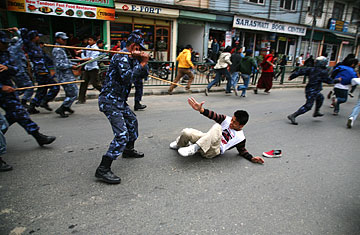
Security forces tackle demonstrators during a pro-Tibet protest outside the UN headquarters in Nepal on March 17
China's assertion that it doesn't interfere in other countries' internal affairs has always suited the country's leaders for two reasons: it allows China to do business in places with dubious human rights records such as Sudan and Zimbabwe; and it serves as a ready "mind your own business" rebuttal to critics of Beijing's own internal policies in places such as Tibet. But as China grows more powerful, its leaders are finding it increasingly difficult to walk this laissez-faire diplomatic line. Beijing has gone along with the deployment of United Nations peacekeepers to Sudan's troubled Darfur province, and is even providing some troops of its own. Prime Minister Wen Jiabao recently called for democracy in Burma, another country with close ties to the Chinese government.
Those two examples indicate Beijing is beginning to realize that it needs to be a good global citizen. But China's increasing willingness to interfere in the internal affairs of other countries does not mean the country isn't tending its own interests. Case in point: China's southern neighbor Nepal. Nepal has long looked to India as its natural ally in the region. But in the past few years successive governments in Kathmandu, perhaps sensing that Beijing and not New Delhi will be the real power in coming decades, have grown closer to China. Just how close the two have become can be seen in Nepal's reaction to the flare-up in Tibet. Nepal is home to a sizable Tibetan exile community. Officially, Tibetans are not allowed to organize politically in Nepal or air their anti-China grievances. A series of peaceful protests outside the Chinese embassy and at a United Nations building in Kathmandu over the past week have been broken up, sometimes brutally, by Nepalese police. Activists and journalists claim that, during the embassy protest on March 15, Chinese officials directed the police and also took photos of protestors.
Beijing has also deployed security officials inside Nepal, presumably to help detect fleeing Tibetans and keep a lid on unrest. Chinese security agents even stopped a reporter and photographer from Agence France-Presse from working inside Nepal three days ago, a small but heavy-handed example of China's reach.
There are other examples. Tourism officials and mountain-climbing companies in Nepal said last week that Beijing has asked Nepal to shut down access to southern climbing routes up Mt. Everest. This year's Olympic torch relay includes a visit to the summit of the world's highest mountain; Chinese authorities recently announced that they are closing their side of Everest — the northern slopes — because of overcrowding and environmental concerns. Most climbers believe the real reason is that China wants to prevent any demonstrations that would mar the event. Last year, climbers unfurled a banner at Everest base camp playing on the Beijing Olympic Slogan: "One World, one Dream, Free Tibet 2008," the banner read.
China reportedly has asked Nepal to close the mountain in late April and early May, when the torch would be making its ascent. This time period is the high season for climbing in the Himalayas. After originally indicating Nepal was considering China's request, Nepalese officials have since denied receiving it — although an official told a Nepalese newspaper that climbing on Everest may still be curtailed because of complications due to Nepal's upcoming elections. Ang Tsering from the Nepal Mountaineering Association says "no official word has been given by the government." But he estimated a two-week ban would cost Nepal about $1.5 million in climbing fees—peanuts compared with the tens of millions in aid and loans that Beijing gives Nepal. "It basically shows how much influence the Chinese government has here, says Tibetan activist Tashi Dhundup, 32, who lives in Nepal. We can't even walk outside the Chinese embassy without getting clubbed about."
China has every right to negotiate and make deals with foreign governments, of course. Mountaineers may protest, but China and Nepal are also within their rights to take such a decision. But it is probably time for Beijing to stop pretending that it doesn't interfere in other countries affairs. With power comes recognizing your own influence, not denying it.
